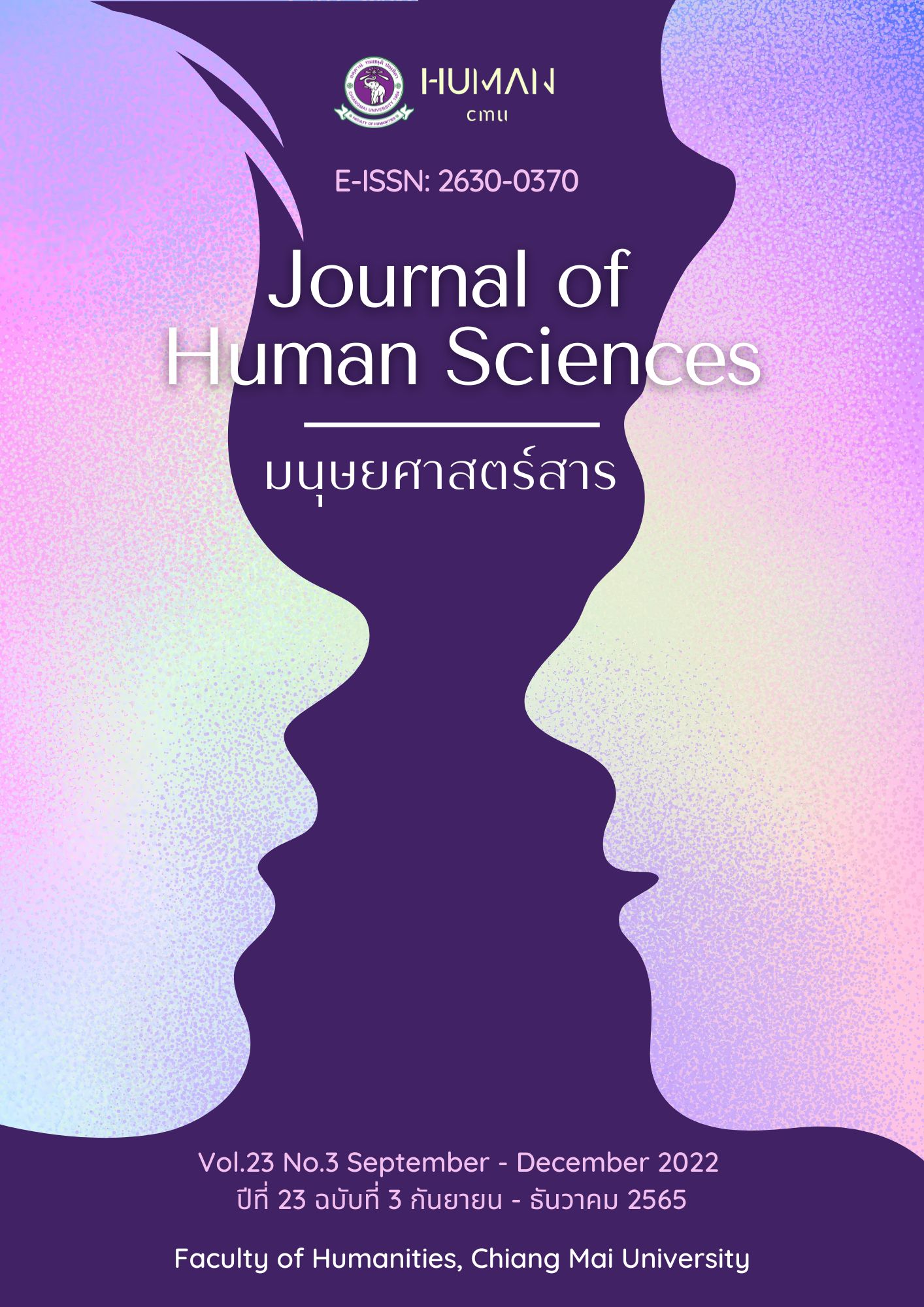เมื่อความรุนแรงคือจุดเริ่มต้น: ฟาน็องกับตัวตนที่ถูกถอนรากอาณานิคม
Main Article Content
บทคัดย่อ
บทความนี้ต้องการตอบคำถามที่ว่า ‘ทำไมความรุนแรงสำหรับ Frantz Fanon จึงเป็นสิ่งที่ช่วยถอดถอนรากอาณานิคมและสร้างตัวตนใหม่ขึ้นมาได้’ โดยอาศัยความคิดเรื่อง Ressentiment ของ Nietzsche เป็นกรอบเพื่อทำความเข้าใจ โดยจะเริ่มจากการทำความเข้าใจความรุนแรงในมุมมองของ Fanon ผ่านการวิเคราะห์ตัวบท ‘On Violence’ ในหนังสือ The Wretched of the Earth ซึ่งเสนอว่าโลกของเจ้าอาณานิคมนั้นเป็นโลกแห่งความรุนแรงที่เจ้าอาณานิคมใช้ปกครองและครอบงำคนท้องถิ่นไว้ แต่ความรุนแรงเองก็ช่วยทำให้ผู้คนในอาณานิคมได้ตระหนักถึงตัวตนใหม่ที่ต้องการจะถอนรากของตนออกจากความเป็นอาณานิคมด้วยเช่นกัน หากทำความเข้าใจคำอธิบายดังกล่าวผ่านแนวคิดเรื่อง Ressentiment ของ Nietzsche จะช่วยทำให้เห็นแง่มุมของความเป็นไปได้ต่าง ๆ ภายหลังจากที่ความรุนแรงได้ทำให้ผู้คนในอาณานิคมตระหนักรู้ถึงตัวตนที่เปลี่ยนแปลงและสถานะที่เท่ากับพวกคนผิวขาวหรือเจ้าอาณานิคมที่ไม่ได้มีฐานะต่ำกว่าเหมือนที่เจ้าอาณานิคมสั่งสอนหรือให้เหตุผลในการยึดครองไว้แต่อย่างใด กรอบดังกล่าวทำให้สามารถอธิบายความคิดเรื่องความรุนแรงของ Fanon ชัดขึ้น เพราะจะเห็นว่าความรุนแรงนั้นคือเครื่องมือของเจ้าอาณานิคมเมื่อใดที่คนท้องถิ่นใช้ความรุนแรงนี้ก็เป็นเสมือนการแทนที่ในตำแหน่งของเจ้าอาณานิคม แต่ไม่ใช่ตัวตนของเจ้าอาณานิคมที่คนท้องถิ่นกำลังกลายเป็น แต่เป็นตัวตนแบบใหม่ที่ถูกถอนรากอาณานิคมไปแล้ว ในแง่นี้ความรุนแรงจึงเป็นจุดเริ่มต้นของการถอดถอนรากของอาณานิคมให้หมดไปจากสังคมใหม่นี้
Article Details

อนุญาตภายใต้เงื่อนไข Creative Commons Attribution-NonCommercial-NoDerivatives 4.0 International License.
เอกสารอ้างอิง
Acampora, C. D. (2019). Nietzsche’s On the Genealogy of Morality: Moral Injury and Transformation. In Tom Stern (ed.), The New Cambridge Companion to Nietzsche, (pp. 222-246). New York: Cambridge University Press.
Ansell-Pearson, K. (1991). Nietzsche contra Rousseau: a study of Nietzsche’s moral and political thought. Cambridge, UK: Cambridge University Press.
Arendt, H. (1969). Crises of the Republic. Orlando: Harcourt Brace & Company.
Bell, D. (2001). The End of Ideology: On the Exhaustion of Political Ideas in the Fifties. Cambridge: Harvard Univerity Press.
Butler, J. (2008). Violence, Nonviolence: Sartre on Fanon. In Jonathan Judaken (ed.), Race after Sartre: Antiracism, Africana Existentialism, Postcolonialism, (pp. 211-231). New York: State University of New York Press.
Chow, R. (2002). The protestant ethnic and the spirit of capitalism. New York: Columbia University Press.
Fanon, F. (1963). The Wretched of the Earth, Richard Philcox (trans.). New York: Grove Press.
Gibson, N. (2003). Fanon: The Postcolonial Imagination. Cambridge, UK: Polity.
Geuss, R. (2019). The Future of Evil. In Simon way (ed.), Nietzsche's On the Genealogy of Morality: A Critical Guide, (pp. 12-23). Cambridge: Cambridge University Press.
Janaway, C. (2007). Guilt, bad conscience, and Self-punishment. In Brian Leiter and Neil Sinhababu (eds.), Nietzsche and Morality, (pp. 138-154). New York: Oxford University Press.
Kawash, S. (1999). Terrorists and Vampires: Fanon’s Spectral Violence of Decolonization. In Anthony C. Alessandrini (ed.), Frantz Fanon: Critical Perspectives, (pp. 237-259). London: Routledge.
Leiter, B. (2015). Nietzsche on Morality. London: Routledge, 2nd edition.
Mbembe, A. (2001). On the Postcolony. Berkeley: University of California Press.
Mbembe, A. (2019). Necropolitlcs. Durham: Duke University Press.
Nayar, P. (2013). Frantz Fanon. New York: Routledge.
Nielsen, C. R. (2013). Frantz Fanon and the Négritude Movement: How Strategic Essentialism Subverts Manichean Binaries. Callaloo, 36(2), 342-352.
Nietzsche, F. (1989a). Beyond Good And Evil, Walter Kaufmann (trans.). New York: Vintage.
Nietzsche, F. (1989b). Ecce Homo, Walter Kaufmann (trans.), and On Genealogy of Morals, Walter Kaufmann and R. J. Hollingdale (trans.). New York: Vintage.
Rabaka, R. (2009). Africana Critical Theory: Reconstructing The Black Radical Tradition, From W. E. B. Du Bois and C. L. R. James to Frantz Fanon and Amilcar Cabral. New York: Lexington Books.
Rabaka, R. (2016). The Negritude Movement: W.E.B Du Bois, Leon Damas, Aime Cesaire, Leopold Senghor, Frantz Fanon, and the evolution of an insurgent idea. New York: Lexington Books.
Risse, M. (2008). Origins of Ressentiment and Sources of Normativity. Nietzsche-Studien, 32(1), 142-170.
Roberts, N. (2004). Fanon, Sartre, Violence, and Freedom. Sartre Studies International, 10(2), 139-160.
Said, E. (1999). Travelling Theory Reconsidered. In Nigel C. Gibson (ed.), Rethinking Fanon: the continuing dialogue, (pp. 197-214). Amherst: Humanity Books.
Scheler, M. (1992). On Feeling, Knowing, and Valuing: Selected Writings. Chicago: The University of Chicago Press.
TenHouten, W. D. (2018). From Ressentiment to Resentment as a Tertiary Emotion. Review of European Studies, 10(4), 49-64.
Tomelleri, S. (2015). Ressentiment: reflections on mimetic desire and society. East Lansing: Michigan State University Press.
Tuinen, S. van. (2018). Introduction. In Sjoerd van Tuinen (ed.), The Polemics of Ressentiment: Variations on Nietzsche, (pp. 1-14). London: Bloomsbury.


